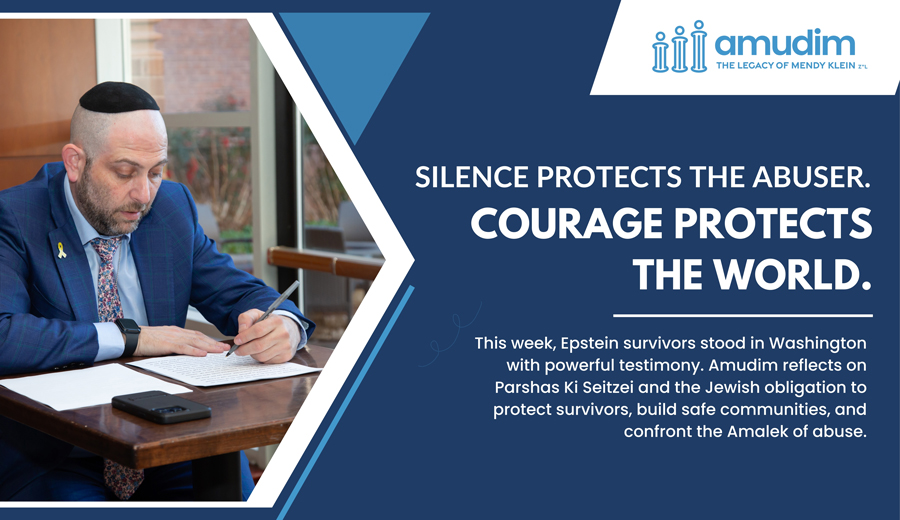
Multiple survivors of Jeffrey Epstein’s abuse stood before the world and spoke their truth in Washington this week, giving testimony that was raw, painful, and courageous and begging elected officials for their support. In doing so, they not only demanded justice for themselves, but they gave a voice to countless others who still live in silence. Their bravery is a living example of the Torah’s eternal call not to look away from suffering.
Interestingly enough, the timing of the Epstein survivors’ testimony echoes several mitzvos that appear in this week’s parsha, Ki Seitzei. Discussing the Torah obligation to return lost objects, the parsha tells us ‘lo suchal l’hisalem’ – you must not remain indifferent to someone else’s misfortune. Further expanding on those words, our sages teach us an important lesson: if we are commanded to take another’s property loss to heart, there is no doubt that we are required to take action when something infinitely more valuable - a person’s dignity, safety, or even their lives - is at stake.
There are other mitzvos in Ki Seitzei that reminds us of our obligation to advocate for survivors as well. Just a few pesukim later, the Torah instructs us to place fences on our roofs to prevent blood from potentially being spilled should someone tumble from their heights. This mitzvah of ma’akeh is another lesson about our collective responsibility to proactively enact safeguards to prevent future harm. Having survivors testifying against their abusers accomplishes that goal, because having their stories shared publicly obligates institutions and communities to institute safeguards to prevent others from being abused.
Parshas Ki Seitzei closes with a commandment to remember Amalek, a nation so heinous that it preyed on the weak and the vulnerable from behind. Never forget the depravity that allows the strong to exploit the powerless, warns the Torah, a message so important that we read it not only during the week of Parshas Ki Seitzei, but also on the Shabbos before Purim.
Abuse is the Amalek of our generation, targeting those who are compromised, thriving in silence, and destroying lives in the shadows. By confronting abuse head on, overpowering the darkness with light, and ensuring that predators can no longer hide behind shields of influence and power we can fulfill our obligation never to forget Amalek’s treachery.
In its timeless perfection, Parshas Ki Seitzei remind us to stand with survivors instead of remaining indifferent. To create safe environments for our children and communities, a real life expansion of our obligation to build protective fences. To stand up for those who are in pain, protecting them from Amalekite abusers.
Scrolling back multiple parshiyos, we recall how Miriam’s urging her parents to continue bringing children into a world of slavery and suffering led directly to the birth of Moshe Rabbeinu. Just imagine - the voice of one young girl resulted in the ultimate redemption of the Jewish nation, changing the destiny of our people forever.
Similarly, hearing survivors and their family members bravely sharing their personal stories as they advocated for the full release of the Epstein files can potentially bring about a redemption of another sort, for themselves, our communities, and for generations to come.
“Look these survivors in the eye and tell them why,” demanded a tearful Sky Roberts in Washington D.C., appealing directly to elected officials. Roberts was speaking on behalf of his sister, Epstein victim Virginia Guiffre, who died by suicide last April at the age of 41.
“The survivors of this horrific abuse are watching,” added Roberts. “The American people are watching. And history is watching. Which side will you be on?”
Sharing her personal journey of pain and suffering, Epstein survivor Anouska DeGeorgiou challenged lawmakers to stand with the truth, saying that she would continue to use her voice, which had been silenced for so many years, to advocate for survivors.
“I am no longer weak,” said DeGeorgiou. “I am no longer powerless. And I am no longer alone. And with your vote neither will the next generation be.”
By listening, believing, and standing with Roberts, with DeGeorgiou and with the thousands of survivors who are sharing their stories, we partner in their heroic efforts and bring justice and healing to the world. May we have the strength to heed their words, to act on their testimony, and to build a society that honors the dignity of every individual.
Zvi Gluck is the CEO of Amudim, an organization dedicated to helping abuse victims and those suffering with addiction within the Jewish community and has been heavily involved in crisis intervention and management for the past 24 years. For more information go to www.amudim.org.


